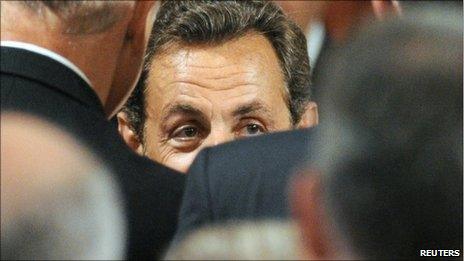Security moves test France's ruling party
- Published

Mr Sarkozy's security policies have come under attack from the left and right of the political spectrum
President Nicolas Sarkozy's summer law and order offensive is placing the French government under severe internal strain.
Several ministers have openly voiced their unease about the expulsions of Roma (Gypsies) and other tough new measures.
Announced after two disturbing outbreaks of anti-police violence in July, the security blitz has led to the closure of more than 100 illegal Roma encampments, with around 1,000 people sent back by plane to Romania and Bulgaria.
At the same time, the government is preparing a law that could see recent immigrants to France stripped of their citizenship if they commit serious crimes such as shooting a policeman.
From the political left, human rights groups, the Catholic Church and the United Nations have come varying expressions of concern and denunciation.
Now it is clear that the clampdown has also created tensions within Mr Sarkozy's own administration, exposing deep differences between security hawks and doves.
Exceptional measures?
Foreign Minister Bernard Kouchner - a former Socialist who made his name at the international charity Medecins Sans Frontieres - admitted this week that he was "shocked" by the focus on people of foreign origin.
He said he had thought about resigning over the Roma expulsions, but in the end decided against it.
Hundreds of Roma have been sent back to Romania and Bulgaria
As for the citizenship-stripping measure, he hoped it would be reserved only for the most exceptional circumstances.
"I hope. I hope. I hope," he said.
Further criticism came from the Defence Minister Herve Morin, head of the small New Centre party, who in a speech attacked "the policy of hate, of fear, of the scapegoat" and said any programme based purely on police repression was doomed to fail.
And on Tuesday, the Towns Minister Fadela Amara - herself of Algerian origin and an avowed left-winger - said she could "never agree" to a policy that placed foreign-born French citizens in a special judicial category.
She also said she was "very clearly against the expulsions" of Roma.
Coupled with doubts expressed by heavyweights inside the ruling UMP party, such as former prime ministers Jean-Pierre Raffarin and Alain Juppe, the comments reveal a government that is far from unanimous over the course that the president has taken.
They also suggest that many senior figures privately share the opposition's view that Nicolas Sarkozy has exploited the law-and-order problem in order to get through a particularly rough time in his presidency.
Temporary fallout
The president's enemies evidently hope that the episode is doing him severe damage.
Mr Sarkozy believes he has public support for his actions
Indeed, at the Socialists' end-of-summer congress last week, the security controversy gave the party a welcome (and rare) opportunity to put up a united front.
However, presidential insiders apaprently make a different calculation.
For them, any negative fallout is likely to be limited and temporary in nature.
They note that in opinion polls a majority of the public supports Roma expulsions and the closure of unauthorised camps.
Interior Minister Brice Hortefeux and Immigration Minister Eric Besson make the point that complaints about Roma have come as much from left-wing municipalities as right-wing ones.
And they also say that the government's actions are merely the application of regulations agreed across the EU, which impose temporary restrictions on the rights of Romanians and Bulgarians to settle in other countries.
Breathing space
President Sarkozy's belief that he knows more about what the man or woman in the street thinks than does the Paris intellectual left is probably correct.
People are more concerned about law and order than the opposition claims, and some of the left's wilder accusations - comparing the moves to those of the wartime collaborationist Vichy regime - actually serve Mr Sarkozy's purpose, because they are so overblown.
To that extent, the security crackdown may indeed provide something of a political breathing-space for the president - for all the chorus of disapproval relayed in the media.
However, as the doubters in government instinctively recognise, the president also needs to step carefully.
Just because his tactic may prove to be effective that does not mean it cannot also be seen as highly cynical.
Many people who do not necessarily disagree with tough policing also suspect Mr Sarkozy of pressing the law-and-order button as a last resort, when all else seems to be going wrong.
There are scores of other concerns in France at the moment: the economy, jobs, pensions, the future of farming, the Bettencourt financial scandal.
With only 18 months now before the 2012 elections, it is not just on law and order that the voters will be passing judgment.
- Published27 August 2010
- Published19 October 2010